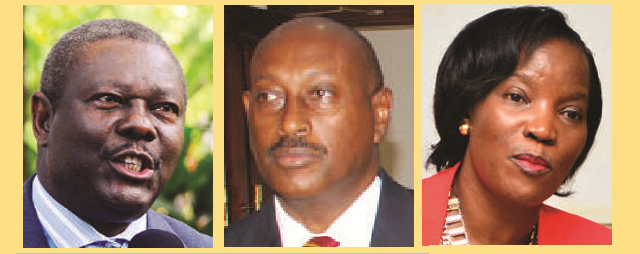
Uganda, at a cost of about $10 million (Approx. Shs36 billion), hired the US-based law firm, Curtis, Mallet-Prevost, Colt &Mosle LLP which specialises in challenging transnational transactions and complex multi-jurisdictional disputes to handle the litigation in London. A local Ugandan law firm, Kampala Associates, also provided the legal support in the country and was reportedly paid Shs10 billion although nothing could be confirmed due to secrecy around the transactions.
“For starters, these are public servants hired to do what they did,” says Golooba, “They are paid salaries.”
“The fact that the officials could even think that they could write to the President and ask to be rewarded and that the President could agree to reward them is what raises serious ethical questions.”
He added that given that this money was hidden even from other people working in the same agencies would suggest these people were not doing the correct thing.
He also thinks that what the team is celebrating is relatively small money for a country like Uganda to celebrate and subsequently reward themselves with public funds.
But Golooba-Mutebi says this is not a corruption issue but an ethical one. He also does not want to relate the presidential handshake scandal to the oil sector. He says Ugandans should be debating the principle.
“The President should not be at liberty to sign away public money to reward whoever he wants to reward; whether the money is from oil, maize, cotton or coffee,” he says, “The problem is how we use public finances.”
The handshake, which has now become a major saga, starts withAkol’s June 26, 2015 letter titled, “Presidential handshake in appreciation of the team that delivered a win for the government of Uganda against Heritage Oil and Gas Limited in the London arbitration.”
In the letter, Akol reminds President Museveni of a meeting held on May 17, 2015 at his western Uganda country home in Rwakitura where she was instructed to recommend an adequate reward for the team that “delivered victory” for the government in a landmark and groundbreaking case against Heritage Oil and Gas Limited to the tune of $434 million in the arbitration case.
“I do hereby propose that a sum of Shs 6b be allocated as a reward to the team, out of which Shs 2.358b will be deducted as tax and the net sum of Shs 3.642b will be given to the team as a take home package,” Akol writes as she concludes her letter signing it off with URA’s slogan:“Developing Uganda Together.”
“Philosophy of reward”
According to Akol’s letter, the amount recommended as a reward is an amount that would enable the beneficiaries use the funds to do something tangible and leave a legacy to remind them and their offspring of their contribution to the nation.
For instance, she wrote that the recommended amount could enable one either to acquire a decent plot of land, pay a deposit on a mortgage or perhaps facilitate finishes on home construction. The proposed amount was to be distributed among 42 individuals that made up the core, non-core, and support staff of the team.
“I believe it will be motivation sufficient for them to gallantly face future challenges and bring glory and victory to our nation,” the letter reads in part. “The amount proposed constitutes less than 1% of the amount in the award and is 50% of the costs awarded to fund its priority areas,” says Akol in the letter.
Akol is referring to 50% of the $4 million (about Shs 11.5 billion) of costs incurred by Uganda which the United Nations Commission on International Trade Law (UNCITRAL) ordered Heritage to pay Uganda. The money was, therefore, logically a refund of what had been spent and not a win in connection with the case. But that is the win which the claimants say called for a “presidential handshake” of Shs6 billion.
Uganda got entangled in a legal battle with Heritage Oil and Gas over a Capital Gains Tax dispute, with the British wildcatter fighting to keep over $400m in taxes following the sale of its interests in Uganda to Tullow in July, 2010 at $1.45b.
The tax dispute became a protracted legal battle and different courts, including a Ugandan Tax Appeal Tribunal and a commercial court in London took four years to resolve it.
The legal gymnastics went on in London until February 24, 2015 when the UNCITRAL issued a unanimous award dismissing all claims.
But following the publication of this information, MPs and the general public have gone up in arms saying the government officials must refund the Shs 6b and a Supreme Court judge, Steven Kavuma has placed an injunction on further debate of the issue.
****
editor@independent.co.ug
 The Independent Uganda: You get the Truth we Pay the Price
The Independent Uganda: You get the Truth we Pay the Price



